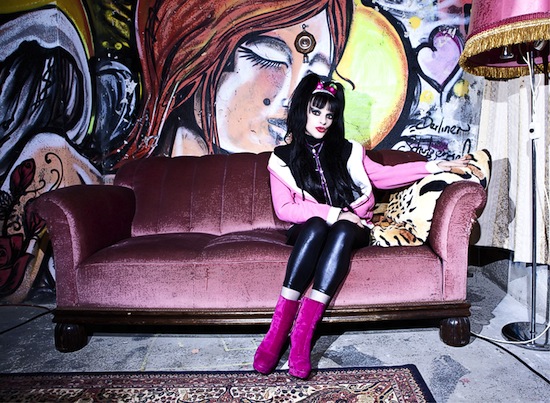German punk legend Nina Hagen is about to perform a one-off show at the Brighton Festival entitled Musik Kabarett, also starring David McAlmont and The Irrepressibles’ Jamie McDermott, featuring songs from an often-subversive Berlin tradition which stretches back to the 1920s. Here she explains the cultural importance of the Kabarett tradition and its influence on her own work.
If you had to explain Kabarett to someone who knew nothing about it, how would you begin?
Nina Hagen: I would educate them about the Berliner Ensemble, the Bertolt Brecht Theatre in East Berlin, where I grew up and started witnessing the theatre plays from age 12 onwards, until I left East Germany in 1976. All Brecht’s theatre pieces are cabaret style, done in the old tradition of political cabaret filled with historic and political material, songs, scenes… so I grew up studying Kabarett.
Is Kabarett a tradition that every German person grows up knowing about, or is it something you actively have to seek out?
NH: I think people have to either seek for it, or be introduced to it via friends, family and social networks. It’s a happy treasure hunt: you can start with Googling Brecht, Weil, Biermann, Neuss…
You grew up in communist East Berlin, where Kabarett was officially tolerated, but carefully censored. Did you realise that was going on?
NH: Yes, of course, for example my stepfather Wolf Biermann was so censored that he was not allowed to perform in public. And I learned that Brecht also had hard times during the McCarthy era in the USA: he was questioned about his work in a public hearing trial. And after the Second World War. Back in Germany, he felt ever so lucky to get his own theatre going. Even in times of Stalinism, his work survived all sorts of control freak-ish times.
Was the Kabarett scene a direct influence on you as a young artist or is it an interest that developed later?
NH: It all started out very early in my life. During my teens I was a member of a secret cabaret group in East Berlin called Die Knoblauchraspel (‘The Garlicsqueezers’). We were inspired by the West German cabaret icon Wolfgang Neuss, who had also worked together with Wolf Biermann. And as a teenager I learned my skills from the world’s bestest political Cabarettieres like Brecht and all the amazing Brecht actors and singers: Wolf Biermann, Wolfgang Neuss, but also from great artists like Karl Valentin, Charlie Chaplin, Heinz Rühmann, Theo Lingen, Heinz Ehrhard, Trude Herr, Lotte Lenya, Gisela May and many others.
Your early works, for example ‘Du Hast Den Farbfilm Vergessen’ (‘You Forgot The Colour Film’), often involved anti-establishment satire. Kabarett artists often dealt with political themes and were strongly associated with underground resistance against the Nazis. Is there a direct connection?
NH: It’s the foundation! I am Kabarett. Life ITSELF is a cabaret! Of course, the old tradition of political cabaret inspired many artists, from all over the world. It influenced rock music, and certainly also punk rock…
What are Kabarett’s distinctly German aspects, which make it different from, for example, French Cabaret or British Music Hall?
NH: Well, in my opinion, even though Bertolt Brecht was born in Germany [in Augsburg], his work was international. His theatre and cabaret was about many different historical world events. His plays and songs were aimed at situations that occur internationally. He did not only cabaretise German situations.
Other than your stepfather, have you ever had the opportunity to meet any of the classic Kabarett artists?
NH: Yes, I met many awesome members of The Berliner Ensemble, for example Hilmar Thate, who played Goebbels, and Eckehard Schall, who played Hitler, in Brecht’s play Der Aufhaltsame Aufstieg Des Arturo Ui (‘The Resistible Rise Of Arturo Ui’). I must have seen them a hundred times between the age of 12 and 21, at the very source, the BE (Berliner Ensemble) in East Berlin. I saw and met Gisela May, Helene Weigl, the great Brecht actresses, who played Mother Courage and many other amazing roles there. They were all my best teachers ever!
Most English-speakers will only be familiar with Kabarett through the Broadway musical/Liza Minnelli film. Are you hoping to educate people that there’s more to it than Sally Bowles?
NH: Of course I do. As an old Brecht student, this is part of my job!
What can people expect from the Musik Kabarett concert in Brighton?
NH: Hopefully a very versatile show with amazing songs and interpretations… with strong feelings and dancing on the ceilings!
Have David McAlmont and Jamie McDermott been asking for your advice about Kabarett, being an actual living, breathing German?
NH: Oh dear, I think they just had to take a glimpse at my performances to realise that no advice is nessessary! We are all family, and learning by doing…
Why did Kabarett die out?
NH: It is still alive! We are working on a new interactive Brecht song evening, premiering June 22 at the Berliner Ensemble, bringing the great spirit of Brecht back to his theatre with a wonderful show re-uniting amazing old and new cabarettists. With many special guests from the old Ensemble, like Gisela May and Carmen-Maja Antoni. Also my mom Eva-Maria Hagen and a most talented Biermann-daughter, Marie Biermann… we will re-enforce the good old tradition again! This is ‘our baby’!
After that, what’s next for you?
NH: In August, participating at the summer peace camp in Büchel, where we peacefully protest against the nuclear weapons in our country.
Nina Hagen performs in Musik Kabarett at the Brighton Dome on Saturday 25 May, and performs Brecht-Lieder-Zur-Klampfe at the Berliner Ensemble on Saturday 22 June


